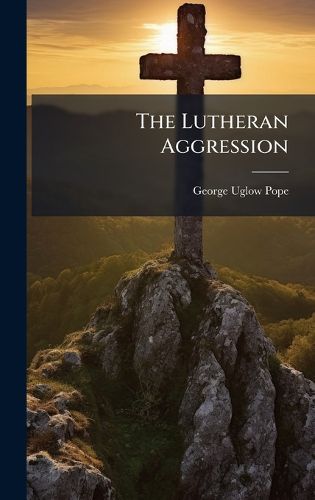Readings Newsletter
Become a Readings Member to make your shopping experience even easier.
Sign in or sign up for free!
You’re not far away from qualifying for FREE standard shipping within Australia
You’ve qualified for FREE standard shipping within Australia
The cart is loading…






"The Lutheran Aggression" presents a detailed response by George Uglow Pope to the Tranquebar Missionaries, critically examining their position, proceedings, and doctrine. Written in the 19th century, this work offers valuable insights into the theological debates and missionary practices of the time. Pope's letter serves as a historical document reflecting the complexities within Christian missions and the nuanced theological landscape of the era. It provides a unique perspective on the challenges and controversies faced by missionaries and the evolving understanding of Christian doctrine.
This work is essential reading for scholars and students of religious history, missiology, and theology. It illuminates the dynamics of interdenominational relations and the intellectual currents shaping Christian thought in the context of global missionary work.
This work has been selected by scholars as being culturally important, and is part of the knowledge base of civilization as we know it. This work was reproduced from the original artifact, and remains as true to the original work as possible. Therefore, you will see the original copyright references, library stamps (as most of these works have been housed in our most important libraries around the world), and other notations in the work.
This work is in the public domain in the United States of America, and possibly other nations. Within the United States, you may freely copy and distribute this work, as no entity (individual or corporate) has a copyright on the body of the work.
As a reproduction of a historical artifact, this work may contain missing or blurred pages, poor pictures, errant marks, etc. Scholars believe, and we concur, that this work is important enough to be preserved, reproduced, and made generally available to the public. We appreciate your support of the preservation process, and thank you for being an important part of keeping this knowledge alive and relevant.
$9.00 standard shipping within Australia
FREE standard shipping within Australia for orders over $100.00
Express & International shipping calculated at checkout
"The Lutheran Aggression" presents a detailed response by George Uglow Pope to the Tranquebar Missionaries, critically examining their position, proceedings, and doctrine. Written in the 19th century, this work offers valuable insights into the theological debates and missionary practices of the time. Pope's letter serves as a historical document reflecting the complexities within Christian missions and the nuanced theological landscape of the era. It provides a unique perspective on the challenges and controversies faced by missionaries and the evolving understanding of Christian doctrine.
This work is essential reading for scholars and students of religious history, missiology, and theology. It illuminates the dynamics of interdenominational relations and the intellectual currents shaping Christian thought in the context of global missionary work.
This work has been selected by scholars as being culturally important, and is part of the knowledge base of civilization as we know it. This work was reproduced from the original artifact, and remains as true to the original work as possible. Therefore, you will see the original copyright references, library stamps (as most of these works have been housed in our most important libraries around the world), and other notations in the work.
This work is in the public domain in the United States of America, and possibly other nations. Within the United States, you may freely copy and distribute this work, as no entity (individual or corporate) has a copyright on the body of the work.
As a reproduction of a historical artifact, this work may contain missing or blurred pages, poor pictures, errant marks, etc. Scholars believe, and we concur, that this work is important enough to be preserved, reproduced, and made generally available to the public. We appreciate your support of the preservation process, and thank you for being an important part of keeping this knowledge alive and relevant.